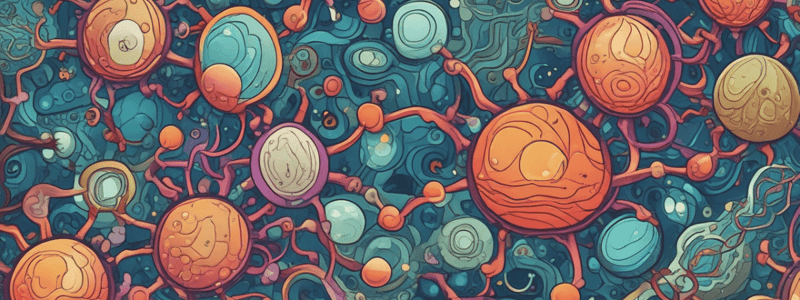Podcast
Questions and Answers
What type of lipoprotein is primarily responsible for transporting triglycerides synthesized by the body?
What type of lipoprotein is primarily responsible for transporting triglycerides synthesized by the body?
- Chylomicrons
- Low-density lipoproteins (LDL)
- High-density lipoproteins (HDL)
- Very-low-density lipoproteins (VLDL) (correct)
Where are lipids primarily stored in the human body?
Where are lipids primarily stored in the human body?
- In the bloodstream
- In muscle tissues
- In the liver
- In white adipose tissue (correct)
Where does lipid catabolism take place?
Where does lipid catabolism take place?
- In the golgi apparatus
- In the mitochondria and peroxisome (correct)
- In the lysosome
- In the nucleus
What is the main component that triglycerides are formed from?
What is the main component that triglycerides are formed from?
How much mass of triglycerides is typically stored in a lean young adult human?
How much mass of triglycerides is typically stored in a lean young adult human?
What is the first step in lipid metabolism?
What is the first step in lipid metabolism?
What type of lipase is present in the mouth?
What type of lipase is present in the mouth?
What role does lipoprotein lipase play in lipid metabolism?
What role does lipoprotein lipase play in lipid metabolism?
What is not broken down by lipases?
What is not broken down by lipases?
Which lipoprotein is mainly responsible for transporting cholesterol to peripheral tissues?
Which lipoprotein is mainly responsible for transporting cholesterol to peripheral tissues?
What helps with mechanical digestion in the stomach?
What helps with mechanical digestion in the stomach?
Where does the majority of lipid digestion and absorption take place?
Where does the majority of lipid digestion and absorption take place?
What is responsible for signaling for the hydrolysis of triglycerides?
What is responsible for signaling for the hydrolysis of triglycerides?
What is the end product of lipid digestion and absorption?
What is the end product of lipid digestion and absorption?
Which part of the digestive system is primarily responsible for the absorption of fats?
Which part of the digestive system is primarily responsible for the absorption of fats?
What are the structures that transport digested lipids from the small intestines to other parts of the body called?
What are the structures that transport digested lipids from the small intestines to other parts of the body called?
What is the main reason why lipids require specialized transport proteins?
What is the main reason why lipids require specialized transport proteins?
What is the role of micelles in lipid absorption?
What is the role of micelles in lipid absorption?
What happens to the fatty acids and monoglycerides once they enter the intestinal epithelial cells?
What happens to the fatty acids and monoglycerides once they enter the intestinal epithelial cells?
Which property of lipoproteins allows them to transport lipids through the blood?
Which property of lipoproteins allows them to transport lipids through the blood?
What is the main function of chylomicrons in the body?
What is the main function of chylomicrons in the body?
Why is the absorption of short-chain fatty acids different from that of long-chain fatty acids?
Why is the absorption of short-chain fatty acids different from that of long-chain fatty acids?
What is the initial breakdown product of triglycerides released by lipoprotein lipase?
What is the initial breakdown product of triglycerides released by lipoprotein lipase?
Where does the main catabolism of fatty acids occur within the cell?
Where does the main catabolism of fatty acids occur within the cell?
What is required for long-chain fatty acids to pass through the mitochondria membrane?
What is required for long-chain fatty acids to pass through the mitochondria membrane?
Which enzyme catalyzes the addition of coenzyme A to fatty acids in the cytoplasm?
Which enzyme catalyzes the addition of coenzyme A to fatty acids in the cytoplasm?
What intermediate does glycerol convert to in the glycolysis pathway?
What intermediate does glycerol convert to in the glycolysis pathway?
Which of the following is NOT a product of triglyceride breakdown?
Which of the following is NOT a product of triglyceride breakdown?
What process follows the conversion of fatty acyl-CoA after it crosses the mitochondria membrane?
What process follows the conversion of fatty acyl-CoA after it crosses the mitochondria membrane?
What is the primary role of lipoprotein lipase in lipid metabolism?
What is the primary role of lipoprotein lipase in lipid metabolism?
What is the primary role of lipid metabolism in cells?
What is the primary role of lipid metabolism in cells?
Which organ in animals is responsible for the synthesis of fats?
Which organ in animals is responsible for the synthesis of fats?
What is the process of breaking down fats for energy called?
What is the process of breaking down fats for energy called?
What is the primary function of structural lipids?
What is the primary function of structural lipids?
What is a key component of the cell membrane?
What is a key component of the cell membrane?
Which of the following statements about lipid metabolism is TRUE?
Which of the following statements about lipid metabolism is TRUE?
What is the name of the process where the body synthesizes fats?
What is the name of the process where the body synthesizes fats?
Which of the following is NOT a key function of lipids in the body?
Which of the following is NOT a key function of lipids in the body?
Flashcards are hidden until you start studying
Study Notes
Lipid Metabolism Overview
- Lipid metabolism encompasses the synthesis (lipogenesis) and degradation (lipid catabolism) of lipids in cells.
- In animals, lipids are derived from dietary intake and synthesized primarily in the liver.
Lipid Digestion
- Digestion initiates the breakdown of triglycerides into smaller monoglycerides via lipase enzymes.
- The process begins in the mouth with lingual lipase, continues in the stomach with gastric lipase, and is primarily completed in the small intestine.
- Pancreatic lipase and bile salts aid the breakdown of triglycerides into free fatty acids and glycerol.
Lipid Absorption
- Short chain fatty acids can be absorbed in the stomach; the majority is absorbed in the small intestine.
- Triglycerides are broken down into fatty acids and monoglycerides, which form micelles for transport across the intestinal membrane.
- Inside intestinal epithelial cells, fatty acids and monoglycerides are reformulated into triglycerides, packed into chylomicrons for transport.
Lipid Transportation
- Lipoproteins are essential for transporting hydrophobic triglycerides and cholesterol in the bloodstream.
- Chylomicrons carry digested lipids from the small intestine to body tissues.
- Types of lipoproteins include very-low-density lipoproteins (VLDL) which transport triglycerides, and low-density lipoproteins (LDL) which transport cholesterol.
Lipid Storage
- Lipids are primarily stored in white adipose tissue as triglycerides.
- In a lean young adult, triglyceride storage can average 10-20 kilograms.
- Triglycerides consist of a glycerol backbone bonded to three fatty acids, formed through the action of acyl-CoA.
Lipid Catabolism
- Chylomicrons are broken down by lipoprotein lipase in capillary endothelial cells to release fatty acids and glycerol.
- Glycerol is converted into glyceraldehyde 3-phosphate for energy production via glycolysis.
- Fatty acid catabolism mainly occurs in the mitochondria, requiring long-chain fatty acids to be converted to fatty acyl-CoA for mitochondrial entry.
- The process of fatty acid breakdown is known as beta-oxidation, crucial for energy production in muscle cells and other tissues.
Studying That Suits You
Use AI to generate personalized quizzes and flashcards to suit your learning preferences.




